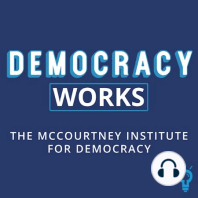5 min listen
School segregation then and now
FromDemocracy Works
ratings:
Length:
39 minutes
Released:
May 6, 2019
Format:
Podcast episode
Description
It’s been 65 years since the Brown v. Board of Education changed public schooling throughout a large portion of the United States. In his opinion, Supreme Court Chief Justice Earl Warren wrote that public education was important to democratic society and the “very foundation of good citizenship.” Integrated schools, the Court argued, would expose children to new cultures and prepare them for an increasingly diverse world.How do you balance the public good against the inherent desire every parent has to do what’s best for their children? It’s a question that schools across the country are still wrestling with today.To help us understand the history of integration and the Brown decision’s impacts on public policy, we’re talking this week with two experts at Penn State. Crystal Sanders is an associate professor of history and African American studies and director of the Africana Research Center. She’s an expert on 20th century African American history. Erica Frankenberg is a professor of education and demography and director of the Center for Education and Civil Rights. She is an an expert on the connection between school segregation and public policy.Crystal and Erica co-chaired a conference at Penn State on the 65th anniversary of the Brown decision.Additional InformationBrown@65 ConferenceBrown v. Board of Education opinionOur episode on school boards with Robert Asen of the University of Wisconsin-MadisonA note to our listeners in the New York City area: Jenna Spinelle will be participating in a panel called “Podcasts to the Rescue! An Emerging Medium for Learning About Civics, Government, and the Social Contract” on Thursday, May 30 at the Metropolitan New York Library Council. The event is free and open to the public. We would love to meet you!Discussion/Reflection QuestionsWhat is the relationship between school segregation and democracy?Did you attend an integrated or a segregated school? How did that impact you once you finished school?How should the education system change to become more integrated?How is the re-segregation that Erica and Crystal affecting students in the U.S.? How is it impacting the country more broadly?Interview Highlights[5:52] What was the political climate when the decision of Brown v. Board of Education was madeThere were many people on the ground; black teachers, black principals, black parents who had been organizing for generations for quality educational opportunities for their students. Decades prior March 1954, black parents were mobilizing to ensure that their students had the resources to ensure that their students to get to school.[7:43] How was the Brown decision received?There was a massive resistance at the beginning. The reason because Dwight Eisenhower in 1957 for sending troops to Little Rock was essentially because the rest of the world was watching and laughing at us. We see white parents taking their kids out of public schools, we see entire school system shutting down, as was the case in Prince, Edward County, Virginia. It takes a very long time before we even began to see real implementation. We are seeing now a widespread re-segregation across the country.[9:37] What are some of the factors that are causing re-segregation?One of the things that most people might not be aware of is that more than 25 states allow communities to secede from a school system and create their own new school system. Across the country, but especially in wealthy suburbs and Southern states, we see wealthy white communities pull out from school systems and create their own new school system that allows them to maintain racial segregation.[12:24] A lot of the conversation around school segregation focuses on the South. What was going on in other parts of the country?It’s important to think about how School desegregation look different in the South versus the North. In northern states there were a lot of ways in which structures were used to create segregated schools. There was the first two decades aft
Released:
May 6, 2019
Format:
Podcast episode
Titles in the series (100)
What is Democracy Works?: From the McCourtney Institute for Democracy at Penn State, this is Democracy Works. In this episode, hosts Michael Berkman and Chris Beem take a few minutes to explain why we wanted to start this podcast and what we hope to achieve through our interviews and conversations. by Democracy Works
